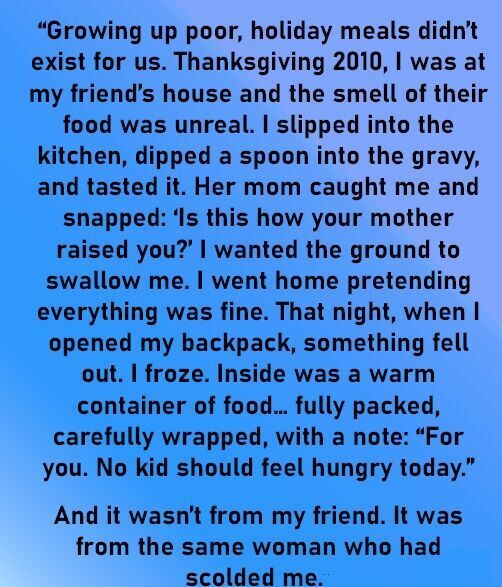Some memories stay with us not because they were warm or easy, but because they forced us to see the world a little differently. One Thanksgiving from my childhood still rises in my mind with startling clarity. It began with a careless moment, a sharp comment, and a wave of embarrassment that made me wish I could disappear.
But by the end of the night, a simple container tucked into my backpack taught me more about dignity and quiet compassion than any heartfelt speech ever could.
It happened at my friend Layla’s house. I had been invited to join their family for Thanksgiving dinner, something that felt both exciting and intimidating. Their home was full of movement—pots simmering on the stove, conversations crisscrossing the room, people stepping in and out of the kitchen with practiced ease.
At the table, I reached for the gravy bowl. My hand slipped, just a little, and a spoonful splattered on the table. Before I could even apologize, Layla’s mother looked at me and said, “Is this how your mother raised you?” The words hit harder than I expected.
A flush of shame rose through me, and for a moment I felt painfully out of place. I spent the rest of dinner trying to make myself as quiet and invisible as possible.
Hours later, when it was time to leave, she handed me a plastic container filled with food—turkey, stuffing, and a slice of pie wrapped in foil. She didn’t smile. She didn’t soften her tone. She simply pushed it into my hands and said, “Take this with you.”
I slipped it into my backpack, unsure what to make of it. It wasn’t until I got home that I understood how much it mattered. My mother welcomed me with tired arms, the kind that held love even on the hardest days. She opened the container with a mix of gratitude and relief, and the two of us shared that meal late at night in our small kitchen.
In that moment, something shifted inside me. I realized that kindness isn’t always warm or polished. It doesn’t always arrive wrapped in gentle words. Sometimes it appears clumsily, almost by accident, from people who don’t know how to express it cleanly. Layla’s mother never apologized for her comment, never explained what she meant, never offered a soft smile to ease the sting.
But she also didn’t send me home empty-handed. Her action, rough around the edges, carried its own message: you are worth feeding, worth caring for, even if I don’t show it gracefully.
That Thanksgiving has stayed with me well into adulthood. It taught me to look twice before assuming I understand someone’s intentions. When I meet people who seem distant or blunt, I pause. I remind myself that not everyone knows how to show kindness in familiar ways. Some people love quietly, awkwardly, or in forms that take time to recognize.
Now, each year when the holiday season arrives, I prepare an extra plate. Sometimes it goes to a neighbor. Sometimes it goes to a friend’s child. Sometimes it just sits on the counter waiting for the right moment.
I keep it in honor of that long-ago dinner, for the kid I once was, and for anyone who might need to hear—even without words—that they are never a burden. They matter, and someone is glad they’re at the table.
